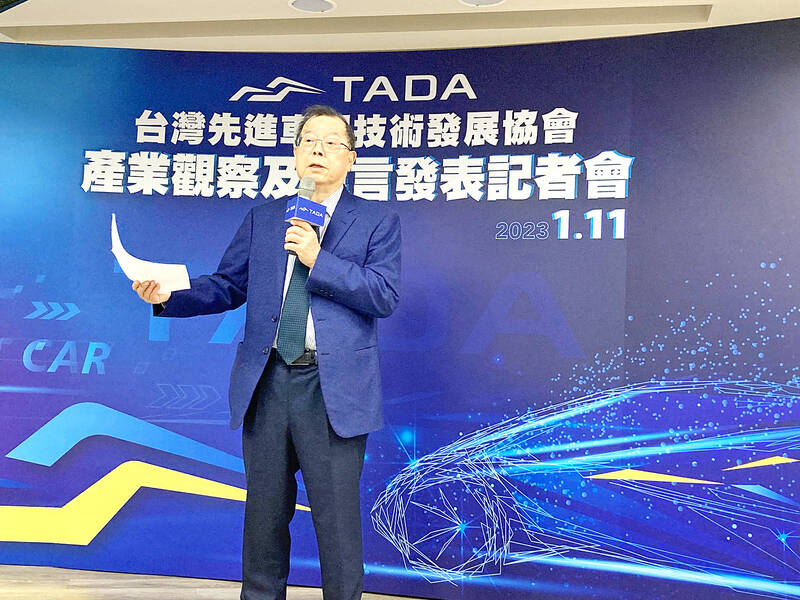Powerchip Semiconductor Manufacturing Corp (力積電) is in preliminary talks with multiple Indian conglomerates to help build new chip plants in the country, it said yesterday, as India subsidizes local chip capacity buildup.
The statement from the maker of memory chips and power management ICs confirmed speculation in the past six months that it was looking to invest in India to diversify its operations amid mounting geopolitical tension.
The company was following similar moves by Taiwan Semiconductor Manufacturing Co (TSMC, 台積電), United Microelectronics Co (聯電) and Hon Hai Precision Industry Co (鴻海精密).

Photo: Lisa Wang, Taipei Times
Tata Group was reportedly one of the possible partners in talks with Powerchip over building a semiconductor fab. Powerchip declined to disclose which companies it is in discussions with.
It is becoming a trend for Taiwanese semiconductor firms to expand operations globally, after TSMC announced its first US semiconductor investment plan, worth US$40 billion, Powerchip said.
“Local semiconductor companies now have to think more seriously about globalization than before,” Powerchip chairman Frank Huang (黃崇仁) told reporters on the sidelines of a news conference in Taipei arranged by Taiwan Advanced Automotive Technology Development Association.
“We are preparing to sign an agreement with India to help it build a plant. It is determined to build one. We are trying to figure out how to support them since we have had similar experience in China,” Huang said.
As India imposes high import duties on semiconductor, it is more cost effective for Indian firms to build a local chip plant, he said.
Powerchip’s parent company, Powerchip Investment Holding Corp (力晶創新投資控股), in October 2015 formed Nexchip Semiconductor Corp (晶合集成) with the Sichuan provincial government to build and operate a fab in Chengdu, China.
Nexchip makes less-advanced chips such as display driver ICs using 150-nanometer and 90-nanometer processes.
Powerchip Investment Holding owns about 27.44 percent of Nexchip Semiconductor shares and a 23.49 stake in Powerchip Semiconductor.
As the talks in India are in the initial stage, Powerchip said it is unclear what role the company would play — as a technology supporter or an equity investor of a joint venture.
US-China trade disputes are positively affecting Taiwanese manufacturers, as Chinese firms and US companies with operations in China are looking for a second source to prevent their shipments from being blocked by Washington, Huang said.
“Taiwan is the best provider of a second source,” he said.
He said he expects Powerchip’s business to start to rebound in the second half of this year, after major supply chain inventory adjustments end following COVID-19 disruptions.
Some notebook computers are still in the process of digesting excessive inventory, he said.
“The first quarter will be the bottom,” he said.
Powerchip said it is cutting factory utilization to cope with sluggish demand, but its loading rate is not as low as some chipmakers that halved production in an attempt to weather the downturn.
The company said it is also facing delays of about six months in ramping up a new 12-inch plant, dubbed the P5 fab, in Miaoli County’s Tongluo Science Park (銅鑼科學園區) due to an extended lead time for semiconductor manufacturing equipment.

SELL-OFF: Investors expect tariff-driven volatility as the local boarse reopens today, while analysts say government support and solid fundamentals would steady sentiment Local investors are bracing for a sharp market downturn today as the nation’s financial markets resume trading following a two-day closure for national holidays before the weekend, with sentiment rattled by US President Donald Trump’s sweeping tariff announcement. Trump’s unveiling of new “reciprocal tariffs” on Wednesday triggered a sell-off in global markets, with the FTSE Taiwan Index Futures — a benchmark for Taiwanese equities traded in Singapore — tumbling 9.2 percent over the past two sessions. Meanwhile, the American depositary receipts (ADRs) of Taiwan Semiconductor Manufacturing Co (TSMC, 台積電), the most heavily weighted stock on the TAIEX, plunged 13.8 percent in

A wave of stop-loss selling and panic selling hit Taiwan's stock market at its opening today, with the weighted index plunging 2,086 points — a drop of more than 9.7 percent — marking the largest intraday point and percentage loss on record. The index bottomed out at 19,212.02, while futures were locked limit-down, with more than 1,000 stocks hitting their daily drop limit. Three heavyweight stocks — Taiwan Semiconductor Manufacturing Co (TSMC, 台積電), Hon Hai Precision Industry Co (Foxconn, 鴻海精密) and MediaTek (聯發科) — hit their limit-down prices as soon as the market opened, falling to NT$848 (US$25.54), NT$138.5 and NT$1,295 respectively. TSMC's

TARIFFS: The global ‘panic atmosphere remains strong,’ and foreign investors have continued to sell their holdings since the start of the year, the Ministry of Finance said The government yesterday authorized the activation of its NT$500 billion (US$15.15 billion) National Stabilization Fund (NSF) to prop up the local stock market after two days of sharp falls in reaction to US President Donald Trump’s new import tariffs. The Ministry of Finance said in a statement after the market close that the steering committee of the fund had been given the go-ahead to intervene in the market to bolster Taiwanese shares in a time of crisis. The fund has been authorized to use its assets “to carry out market stabilization tasks as appropriate to maintain the stability of Taiwan’s

In a small town in Paraguay, a showdown is brewing between traditional producers of yerba mate, a bitter herbal tea popular across South America, and miners of a shinier treasure: gold. A rush for the precious metal is pitting mate growers and indigenous groups against the expanding operations of small-scale miners who, until recently, were their neighbors, not nemeses. “They [the miners] have destroyed everything... The canals, springs, swamps,” said Vidal Britez, president of the Yerba Mate Producers’ Association of the town of Paso Yobai, about 210km east of capital Asuncion. “You can see the pollution from the dead fish.